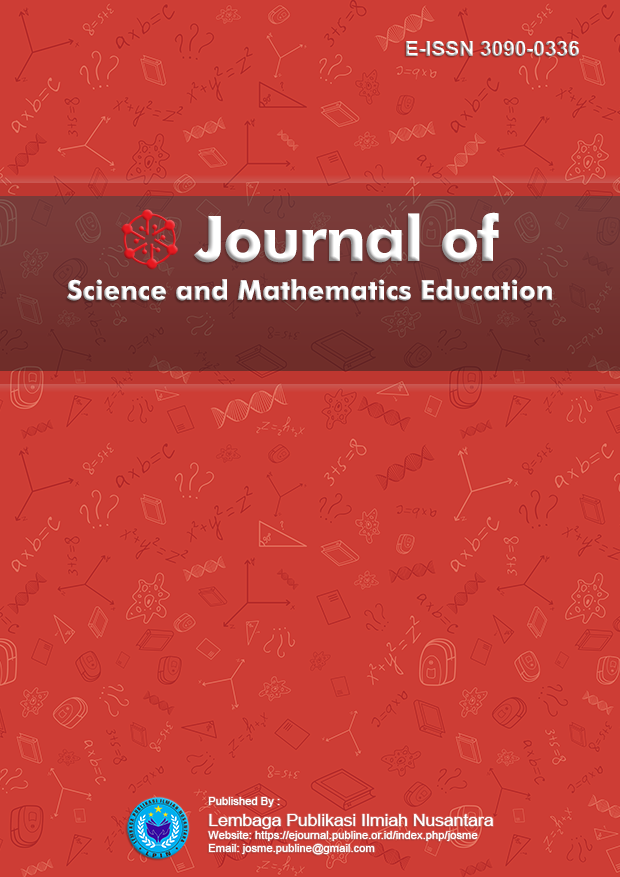Guided Inquiry-Based Learning in Biotechnology: Effects on Students’ Scientific Attitudes and Academic Achievement at Menglait Middle School Brunei Darsussalam
DOI:
https://doi.org/10.70716/josme.v1i3.241Keywords:
Guided Inquiry, Biotechnology, Scientific Attitudes, Academic Achievement, Secondary EducationAbstract
This study investigates the effects of guided inquiry-based learning on students’ scientific attitudes and academic achievement in biotechnology at Menglait Middle School, Brunei Darussalam. Employing a quasi-experimental design, two groups of Year 9 students were involved: the experimental group received biotechnology instruction through guided inquiry-based learning, while the control group experienced conventional teaching methods. Data were collected using a scientific attitude questionnaire and a standardized academic achievement test in biotechnology. The findings revealed a statistically significant improvement in both scientific attitudes and academic achievement among students in the experimental group compared to the control group. Guided inquiry not only fostered curiosity and a more positive attitude toward science but also enhanced students’ conceptual understanding and problem-solving skills. These results underscore the importance of implementing inquiry-based approaches in science education to promote deeper learning and attitudinal development. The study recommends integrating guided inquiry strategies into the science curriculum to support 21st-century learning goals. Moreover, teacher training programs should emphasize the facilitation of inquiry to ensure effective implementation. This research contributes to the growing body of evidence highlighting the pedagogical value of inquiry-based learning in secondary education, particularly in the context of biotechnology, a subject critical for scientific literacy in modern society.
Downloads
References
Alfin, M. B., Cahyono, E., Ridlo, S., Sumarni, W., & Widiyatmoko, A. (2024). The validity of the guided inquiry-based teaching module on additives to improve students' scientific attitudes. Journal of Innovative Science Education, 13(1). https://doi.org/10.15294/jise.v13i1.1020
Gumilar, R. P., Wardani, S., & Lisdiana, L. (2019). The implementation of guided inquiry learning models on the concept mastery, scientific attitude, and science process skill. Journal of Primary Education, 8(5), 148–154.
Guerrero, J. S., & Bautista, R. G. (2023). Inquiry-based teaching in secondary science. International Journal of Social Sciences & Humanities, 8(2). https://doi.org/10.58885/ijssh.v08i2.146.jg
Hasmawati, Ali, M. S., & Arsyad, M. (2023). The influence of the guided inquiry learning model and scientific attitude in physics on students’ science process skills. Jurnal Penelitian Pendidikan IPA, 9(12), 11484–11496. https://doi.org/10.29303/jppipa.v9i12.4729
Lestari, S. M., & Rudyatmi, E. (2023). The effectiveness of a guided-inquiry learning model based on biotechnology practicum materials in improving the learning outcomes of high school students. Journal of Biology Education, 12(2). https://journal.unnes.ac.id/sju/ujbe/article/view/65854
Poedjiastoeti, S. (2017). The effectiveness of guided inquiry-based learning material on students' science literacy skills. Journal of Physics: Conference Series, 947(1), 012049. https://doi.org/10.1088/1742-6596/947/1/012049
Suhendra, H., Yennita, Y., & Irawan, D. (2023). Students’ perception of guided inquiry learning in physics viewed from collaboration skills and scientific attitude. Jurnal Penelitian Pendidikan IPA, 9(8), 6707–6713. https://doi.org/10.29303/jppipa.v9i8.4068
Zion, M., & Mendelovici, R. (2012). Moving from structured to open inquiry: Challenges and limits. Science Education International, 23(4), 383–399.
Tan, Y. S. M., & Nashon, S. M. (2021). Inquiry-based science education reform in Southeast Asia: Challenges and strategies. International Journal of Science Education, 43(2), 241–259. https://doi.org/10.1080/09500693.2020.1865589
OECD. (2020). Future of Education and Skills 2030: Curriculum Analysis. Organisation for Economic Co-operation and Development.
Alfin, M. B., Cahyono, E., Ridlo, S., Sumarni, W., & Widiyatmoko, A. (2024). The validity of the guided inquiry-based teaching module on additives to improve students' scientific attitudes. Journal of Innovative Science Education, 13(1). https://doi.org/10.15294/jise.v13i1.1020
Amaditha, F. F., Fitri, S. G. S., & Ekanara, B. (2024). Students’ communication skills and scientific literacy ability in biology through guided inquiry learning. International Journal of Biology Education Towards Sustainable Development, 4(1), 1–10. https://doi.org/10.53889/ijbetsd.v4i1.435GMPI Journals
Afrianti, S., Novita, N., Ginting, F. W., Syafrizal, S., & Zahara, S. R. (2023). Development of STEM-based LKPD with guided inquiry design to improve student’s science process skills. Radiasi: Jurnal Berkala Pendidikan Fisika, 15(2), 75–85. https://doi.org/10.37729/radiasi.v15i2.2289JUMP
Guerrero, J. S., & Bautista, R. G. (2023). Inquiry-based teaching in secondary science. International Journal of Social Sciences & Humanities, 8(2). https://doi.org/10.58885/ijssh.v08i2.146.jg
Downloads
Published
How to Cite
Issue
Section
License
Copyright (c) 2025 Mohammad Ramli, Rozikin Bohori

This work is licensed under a Creative Commons Attribution-ShareAlike 4.0 International License.











